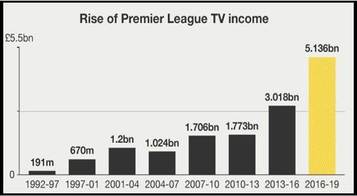1946. Fifty minutes. Twenty in the first half, thirty in the second, the first live televised soccer match broadcast by the BBC, with coverage cut short due to fading light and limited technology.
2016. 168 live games at an average of £10.2 million per game. Saturday packages, Sunday packages and for the first time ever, Friday night fixtures. A record deal for live broadcasting rights to the English Premier League (EPL) with Sky and BT having agreed to pay £5.136bn for live TV coverage rights for three seasons from the beginning of the 2016/17 campaign. A deal on this scale may be new to the UK, but they have been getting progressively bigger over the years, and the EPL now joins the top table of sports broadcasting deals.
The new Sky and BT deal with the EPL represents the fourth largest broadcasting deal in history in terms of total amount paid for rights, behind the NFL (American Football), NBA (basketball) and MLS (baseball). In terms of cost per annum, the deal is tied with the NBA as the second most expensive agreement, as reflected in the table below.
 Source: BBC
Source: BBC In a previous post, reference was made to the fact that the arrival of the EPL, BSkyB and TV revenue heralded an influx of non-British players in search of lucrative financial rewards. Following the announcement of the new EPL deal, the President of La Liga, Javier Tebas, sounded a warning to Spanish clubs to have a more equitable distribution of TV revenue or face losing its stars to the EPL. This would no doubt only further increase the profitability and selling power of the EPL product for future TV deals. Time will tell, but would Messi, Rodríguez or Ronaldo really fancy it on a wet, blustery night in Stoke? For the right price, I venture they would.
Pádraig MacConsaidín holds a BSc Government degree from University College Cork and is the Department of Government, Richard Haslam - Graduate of the Year 2014.


 RSS Feed
RSS Feed